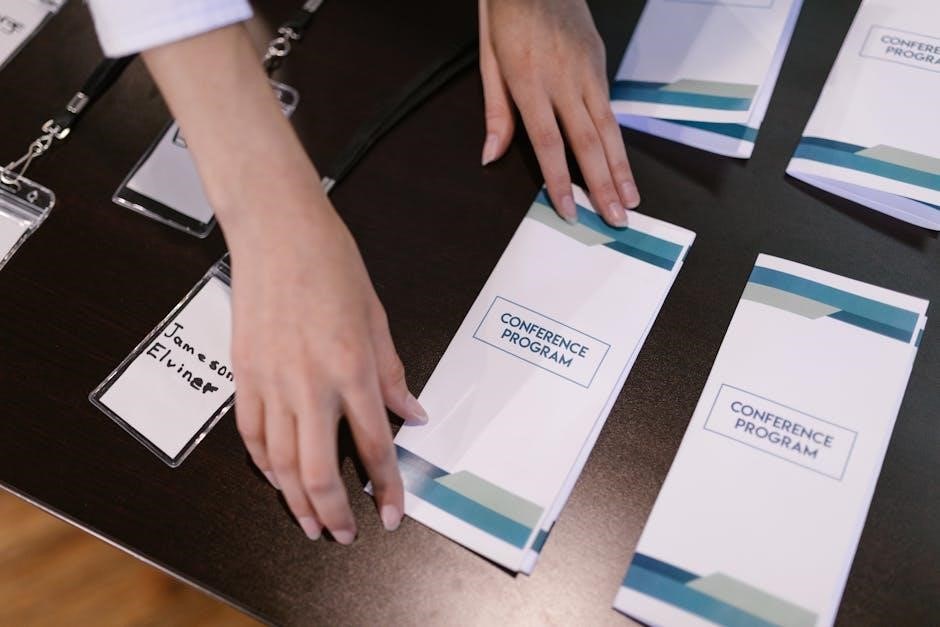An assessment center evaluates candidates through various exercises like presentations, group activities, and interviews. It assesses competencies critical for job success, often using PDF guides for preparation, which include sample questions and proven strategies to enhance performance.
1.1 Overview of Assessment Centers
Assessment centers are structured environments where candidates undergo various exercises to evaluate their skills and competencies for specific roles. They include activities like presentations, group discussions, interviews, and psychometric tests. These centers are not physical locations but methods to assess applicants through tailored exercises. The process aims to measure job-relevant abilities, ensuring accurate hiring decisions. Preparation materials, such as PDF guides, often include sample questions and strategies to help candidates excel in these evaluations.
1.2 Importance of Preparation
Preparation is crucial for success in assessment centers, as it helps candidates understand the test formats, practice time management, and improve problem-solving skills. Utilizing resources like PDF guides provides access to sample questions and proven strategies, reducing anxiety and enhancing performance. Thorough preparation ensures candidates can confidently showcase their abilities, address competencies effectively, and demonstrate readiness for the role during evaluations.
1.3 Role of PDF Guides in Preparation
PDF guides play a vital role in preparation by offering structured practice materials tailored to assessment center tests. They provide sample questions, detailed answers, and expert strategies, helping candidates familiarize themselves with test formats and improve problem-solving techniques. These guides often include exercises for numerical, verbal, and cognitive ability tests, along with case studies and interview tips, ensuring comprehensive preparation and boosting confidence for assessment day.

Types of Assessment Center Exercises
Assessment centers use diverse exercises to evaluate candidates, including individual presentations, group assessments, interviews, case interviews, and psychometric tests. These exercises are designed to measure specific skills and competencies relevant to the role, ensuring a holistic evaluation of each candidate’s abilities and suitability for the position.
2.1 Individual Presentations
Individual presentations are a key component of assessment centers, requiring candidates to deliver a structured and engaging presentation on a specific topic. These presentations often involve analyzing data, proposing solutions, or recommending actions. Candidates are typically given a set timeframe to prepare and present, demonstrating their ability to communicate clearly and persuasively while under pressure. Assessors evaluate both the content and delivery, focusing on clarity, confidence, and the ability to address questions afterward. Proper preparation and rehearsal are essential for success in this exercise.
2.2 Group Assessments
Group assessments evaluate teamwork, communication, and problem-solving skills through collaborative exercises. Candidates often participate in role-plays, case studies, or discussions, demonstrating how they contribute to a team. Assessors observe leadership qualities, adaptability, and the ability to resolve conflicts. These exercises simulate workplace scenarios, requiring candidates to articulate ideas clearly and work toward a common goal. Preparation involves practicing active listening and showing willingness to collaborate, while also showcasing individual strengths within a group setting.
2.3 Interviews (Live and Pre-Recorded)
Interviews, whether live or pre-recorded, are crucial in assessment centers to evaluate candidates’ skills and experiences. Live interviews allow for spontaneous interaction, while pre-recorded ones provide a structured format. Candidates should prepare by researching common questions, practicing the STAR method, and tailoring answers to the job’s competencies. PDF guides often include sample questions and tips for confidence-building. Staying calm and articulating thoughts clearly are essential for success in both formats.
2.4 Case Interviews
Case interviews assess problem-solving skills by presenting real business scenarios. Candidates must analyze the situation, identify key issues, and propose solutions. Preparation involves practicing with sample cases, improving analytical thinking, and learning to structure answers clearly. PDF guides and practice tests provide valuable insights, helping candidates understand expectations and refine their approach. Effective communication and logical reasoning are critical for success in these interviews.
2.5 Psychometric Testing
Psychometric tests evaluate cognitive abilities and personality traits through multiple-choice questions. They assess numerical, verbal, and logical reasoning skills. Preparation involves practicing sample questions to improve speed and accuracy. PDF guides often include test strategies, such as time management and eliminating incorrect answers. Familiarizing oneself with test formats and common question types can significantly enhance performance. These tests are widely used to determine a candidate’s suitability for specific roles.

Criteria Cognitive Ability Test (CCAT)
The CCAT assesses problem-solving skills through multiple-choice questions. It evaluates logical reasoning, math, and language abilities. Preparation with sample questions and strategies in PDF guides is essential for success.
3.1 CCAT Test Format
The CCAT is a 15-minute test featuring 50 multiple-choice questions. It assesses verbal, numerical, and logical reasoning skills. Questions increase in difficulty, and candidates must answer as many as possible. The test is strictly timed, emphasizing speed and accuracy. Sample questions and detailed explanations are available in PDF guides, helping candidates familiarize themselves with the format and improve their problem-solving abilities. Practice is crucial to enhance performance in this challenging assessment.
3.2 Sample CCAT Questions and Answers
Sample CCAT questions are designed to mirror the actual test, covering verbal, numerical, and logical reasoning. For example, a verbal question might ask to complete a sentence, while a numerical question could involve basic calculations. Answers are provided with detailed explanations, helping candidates understand their mistakes. These samples are available in PDF guides, offering a clear preview of the test format and content. Regular practice with these questions improves problem-solving speed and accuracy, ensuring better performance on the actual CCAT.
3.3 Preparation Strategies for CCAT
Effective CCAT preparation involves practicing with sample questions and understanding the test format. Utilize online resources and PDF guides to access realistic practice tests. Focus on improving time management by solving questions under timed conditions. Reviewing explanations for incorrect answers helps identify weak areas. Additionally, enhance problem-solving skills through logical and numerical exercises. Regular practice builds confidence and ensures readiness for the actual test, maximizing performance in the assessment center.

Numerical and Verbal Reasoning Tests
Numerical and verbal reasoning tests evaluate problem-solving and comprehension skills. Practice with sample questions and PDF guides to enhance data analysis and logical reasoning abilities effectively.
4.1 Numerical Reasoning Questions
Numerical reasoning tests assess your ability to interpret and analyze data. Questions often involve calculations, percentages, ratios, and graph interpretation. Practice with sample questions and PDF guides to improve problem-solving skills. Time management is key, as these tests are typically timed. Focus on accuracy and logical reasoning to excel in numerical assessments, ensuring you demonstrate strong analytical capabilities during the evaluation process.
4.2 Verbal Reasoning Questions
Verbal reasoning tests evaluate comprehension, attention to detail, and logical reasoning. Questions often involve analyzing passages, identifying true/false statements, or completing sentences. Practice with sample PDF guides to improve your ability to interpret complex texts. Focus on skimming techniques and identifying key points quickly. Manage your time effectively, as these tests are timed, and ensure accurate answers by reading each statement carefully to avoid errors. Regular practice enhances your verbal reasoning skills and boosts confidence during assessments.
4.3 Tips for Solving Reasoning Tests
To excel in verbal and numerical reasoning tests, practice skimming techniques to identify key details quickly. Focus on solving sample questions from PDF guides to build speed and accuracy. Manage your time wisely, prioritizing questions you find easier. Avoid overthinking; eliminate incorrect options first in multiple-choice formats. Read instructions carefully and use any provided formulas or data effectively. Stay calm, review your answers if time allows, and maintain focus to ensure optimal performance.

Assessment Center Interview Questions
Assessment center interviews often include competency-based questions, focusing on teamwork, problem-solving, and leadership. Use the STAR method to structure answers effectively, ensuring alignment with the role’s competencies.
5.1 Common Interview Questions
Common assessment center interview questions often revolve around past experiences, such as describing a time when you overcame a challenge or led a team. Employers seek evidence of skills like problem-solving, communication, and adaptability. Questions may also focus on your understanding of the company and role, requiring concise, structured responses. Practicing with sample questions from PDF guides can help you articulate your experiences confidently and effectively.
5.2 Using the STAR Method for Answers
The STAR method is a structured approach to answering interview questions effectively. It stands for Situation, Task, Action, and Result. By organizing your response in this format, you provide clear, concise, and relevant examples from your experience. This method helps you showcase your skills and achievements while keeping your answers focused and impactful. Practicing with PDF guides and sample questions can refine your ability to apply the STAR technique seamlessly during assessments.
5.3 Tailoring Answers to Competencies
To excel in assessment centers, align your responses with the competencies the employer values. Identify these from the job description and practice integrating them into your answers. For example, if leadership is key, provide examples demonstrating your leadership skills. Use specific instances to highlight how you applied these competencies successfully. This tailored approach ensures your answers resonate with the assessors’ expectations, enhancing your chances of success. Utilize PDF guides to refine your strategy and deliver impactful responses.

Group Exercises and Activities
Group exercises evaluate teamwork, communication, and decision-making skills. Activities include role-plays, problem-solving tasks, and discussions, requiring active participation and collaboration to achieve shared goals effectively.
6.1 Types of Group Activities
Group activities in assessment centers include role-plays, case studies, and problem-solving exercises. These tasks assess collaboration, leadership, and decision-making skills. Candidates often engage in discussions, brainstorming sessions, and presentations to demonstrate teamwork. Activities like in-tray exercises and group presentations are also common, requiring participants to prioritize tasks and communicate effectively. These exercises simulate real workplace scenarios, helping employers evaluate how candidates perform under pressure and in collaborative environments.
6.2 How to Excel in Group Assessments
To excel in group assessments, focus on active participation and clear communication. Contribute ideas confidently and listen to others, demonstrating teamwork and leadership. Stay organized, prioritize tasks, and manage time effectively. Use structured approaches like the STAR method to articulate thoughts clearly. Show initiative by taking the lead when appropriate, while also supporting teammates. Avoid dominating discussions and ensure equal participation. Practice with sample exercises to build confidence and improve problem-solving skills, ensuring a polished performance during the assessment.
6.3 Common Mistakes in Group Exercises
Common mistakes in group exercises include poor communication, lack of active listening, and failing to contribute ideas. Overlapping conversations and not respecting others’ opinions can hinder progress. Avoid dominating discussions or remaining passive, as both extremes negatively impact performance. Mismanaging time and failing to stay focused on the task are also frequent errors. Additionally, neglecting to summarize key points or agree on a collective decision can reduce the group’s effectiveness. Practice and preparation are essential to avoid these pitfalls and ensure a cohesive, productive effort.

Presentation Tips and Techniques
Prepare a clear structure, practice delivery, and use visual aids to enhance engagement. Focus on key points, maintain eye contact, and encourage audience interaction for effective presentations.
7.1 Preparing for an Individual Presentation
Preparing for an individual presentation requires researching the company, practicing with sample questions, and organizing your content clearly. Use the STAR method to structure your answers and focus on key competencies. Rehearse your delivery to ensure confidence and clarity, and anticipate potential questions from the assessors. Utilize PDF guides for tips on presentation techniques and common pitfalls to avoid, ensuring you showcase your skills effectively during the assessment.
7.2 Structuring Your Presentation Effectively
Start with a clear introduction, stating the purpose and key points. Use the STAR method to structure your answers, ensuring each point is concise and relevant. Organize your content into logical sections, such as problem analysis, recommendations, and conclusions. Anticipate questions and prepare responses in advance. Use visual aids sparingly to enhance clarity. Conclude with a strong summary, reinforcing your main points. Practice your timing to ensure you deliver within the allotted timeframe, demonstrating confidence and professionalism throughout the presentation.
7.3 Handling Questions After Presentations
Stay calm and composed when fielding questions. Listen actively to ensure understanding before responding. Use the STAR method to structure clear, concise answers. Avoid jargon and keep responses relevant to the topic. If unsure, acknowledge the question and offer to provide more information later. Maintain eye contact and confidence, demonstrating your ability to think critically under pressure. Prepare for common questions in advance to enhance your credibility and poise during the Q&A session.

Time Management and Test Strategies

Effective time management is crucial for maximizing scores. Prioritize questions, allocate time per question, and use elimination techniques for multiple-choice answers to optimize performance under pressure.
8.1 Managing Time During Tests
Managing time effectively during tests is essential for success. Allocate a set amount of time to each question, ensuring you leave enough for the most challenging ones. Use a timer to simulate real test conditions and avoid spending too long on a single question. Practice skipping difficult questions initially and return to them later. This strategy helps maintain momentum and prevents time from running out before completing the test.
8.2 Strategies for Multiple-Choice Questions
For multiple-choice questions, start by skimming all options before reading the question carefully. Eliminate obviously incorrect answers to increase your chances of selecting the right one. Use the process of elimination to narrow down choices, especially if the question is complex. Always read each option thoroughly and consider any keywords that might indicate the correct answer. Practice with sample tests to improve speed and accuracy, ensuring you’re well-prepared for the format.
8.4 Avoiding Common Time-Management Mistakes
Allocate a set time per question to avoid spending too long on one. Skim through the entire test first to identify easier questions and tackle them quickly. Avoid getting stuck on difficult questions—mark them and return later. Use practice tests to improve speed and accuracy, ensuring you complete all sections. Prioritize questions you’re confident about to maximize your score within the time limit. Effective time management is key to performing well in assessment centers.

Handling Nerves and Pressure
Manage stress by practicing deep-breathing exercises and positive visualization. Stay focused, and use preparation to build confidence. Regular practice helps reduce anxiety and improves performance under pressure.
9.1 Managing Stress During Assessments
Stress during assessments is common but manageable. Practice deep-breathing exercises to calm your nerves and maintain focus. Positive visualization can help reduce anxiety. Ensure adequate preparation, as confidence builds from familiarity with the material. Stay hydrated and well-rested to maintain cognitive clarity. Break tasks into smaller steps to avoid overwhelm. Remember, it’s okay to take a moment to collect your thoughts before responding. Regular practice and mindfulness techniques can significantly ease pressure and improve performance.
9.2 Building Confidence for Assessment Day
Building confidence for assessment day begins with thorough preparation. Familiarize yourself with common questions and practice answering them using the STAR method. Conduct mock interviews and review past successes to reinforce your strengths. Understanding the format and expectations of the assessment center can also reduce uncertainty. Engage in positive self-talk and visualize a successful outcome. Leveraging resources like PDF guides and practice tests can further boost your confidence, ensuring you feel prepared and capable of excelling.
9.3 Techniques for Staying Focused
To stay focused during assessments, practice mindfulness and deep breathing exercises to calm your mind. Break tasks into smaller, manageable steps and set micro-goals to maintain momentum. Use positive affirmations to reinforce self-belief. Stay hydrated and energized with light snacks. Regularly review your progress and adjust strategies as needed. Familiarize yourself with the assessment format to reduce distractions. Lastly, practice relaxation techniques to maintain concentration and composure under pressure, ensuring optimal performance throughout the evaluation.
Effectively preparing for assessment centers requires consistent practice and strategic planning. Utilize PDF guides and practice tests to refine your skills. Stay focused, manage time wisely, and confidently showcase your abilities on assessment day.
10.1 Summarizing Key Preparation Tips
To excel in assessment centers, focus on consistent practice with PDF guides and sample questions. Understand the test format, manage time effectively, and use strategies like the STAR method for interviews. Review numerical and verbal reasoning techniques, and prepare for group exercises by practicing collaboration and leadership. Stay calm, minimize errors, and tailor your responses to the required competencies. Utilize online resources and mock tests to build confidence and ensure readiness for the assessment day.
10.2 Final Advice for Assessment Day
Arrive early, stay calm, and be confident. Review your notes, practice with PDF guides, and ensure you understand the format. Use the STAR method for interviews and manage stress with deep breathing. Stay focused, avoid distractions, and showcase your skills authentically. Remember, preparation is key, so trust your abilities and approach each task with a clear mindset. Good luck, and make a lasting impression!
10.3 Resources for Further Practice
Enhance your preparation with official PDF guides and online resources. Platforms like JobTestPrep and AssessmentCentre.net offer realistic practice tests and detailed explanations. Utilize free tools like CCAT sample questions and numerical reasoning exercises. Download IELTS Listening Tests for verbal practice. Explore interactive tests on Safebridge for maritime assessments. Leverage Wineland-Thomson guides for tailored strategies. These resources provide a comprehensive approach to mastering assessment center challenges and improving your performance.
